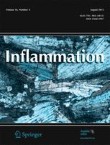
Medicine by Alexandros G. Sfakianakis,Anapafseos 5 Agios Nikolaos 72100 Crete Greece,00302841026182,00306932607174,alsfakia@gmail.com,
Ετικέτες
Πέμπτη 2 Απριλίου 2020
Sanggenon C Ameliorates Cerebral Ischemia-Reperfusion Injury by Inhibiting Inflammation and Oxidative Stress through Regulating RhoA-ROCK Signaling
Sanggenon C Ameliorates Cerebral Ischemia-Reperfusion Injury by Inhibiting Inflammation and Oxidative Stress through Regulating RhoA-ROCK Signaling:


Sanggenon C (SC), a natural flavonoid extracted from Cortex Mori (Sang Bai Pi), is reported to possess anti-inflammatory and antioxidant properties in hypoxia. The present study aimed to investigate the therapeutic potential and the underlying mechanisms of SC in cerebral ischemia-reperfusion (I/R) injury. A rat model of reversible middle cerebral artery occlusion (MCAO) was used to induce cerebral I/R injury in vivo, and SC was administrated intragastrically. Brain injuries were evaluated using Bederson scores, brain water content, and 2, 3, 5-triphenyltetrazolium chloride (TTC) staining. The levels of inflammatory factors and oxidative stress were examined using corresponding kits. Cell apoptosis was evaluated by TUNEL. Moreover, the expressions of apoptosis-related and RhoA/ROCK signaling-related proteins were detected through western blotting. In vitro, RhoA was overexpressed in oxygen-glucose deprivation and reperfusion (OGD/R)-induced PC12 cells to confirm the contribution of RhoA-ROCK signaling inhibition by SC to the neuroprotective effects post OGD/R. Pretreatment with SC significantly ameliorated the neurologic impairment, brain edema, and cerebral infarction post MCAO-reperfusion, associated with reductions of inflammation, oxidative stress, and cell apoptosis in the brain. Furthermore, SC remarkably downregulated the expression of RhoA/ROCK signaling-related proteins post MCAO-reperfusion in rats, while overexpression of RhoA reversed the beneficial effects of SC on protecting against inflammation and oxidative stress in OGD/R-induced PC12 cells. Taken together, these findings demonstrated that SC exerts neuroprotective effects after cerebral I/R injury via inhibiting inflammation and oxidative stress through regulating RhoA-ROCK signaling, suggesting a therapeutic potential of SC in cerebral I/R injury.
Αναρτήθηκε από
Medicine by Alexandros G. Sfakianakis,Anapafseos 5 Agios Nikolaos 72100 Crete Greece,00302841026182,00306932607174,alsfakia@gmail.com,
στις
11:31 μ.μ.

Ετικέτες
00302841026182,
00306932607174,
alsfakia@gmail.com,
Anapafseos 5 Agios Nikolaos 72100 Crete Greece,
Medicine by Alexandros G. Sfakianakis,
Telephone consultation 11855 int 1193
Εγγραφή σε:
Σχόλια ανάρτησης (Atom)

Δεν υπάρχουν σχόλια:
Δημοσίευση σχολίου